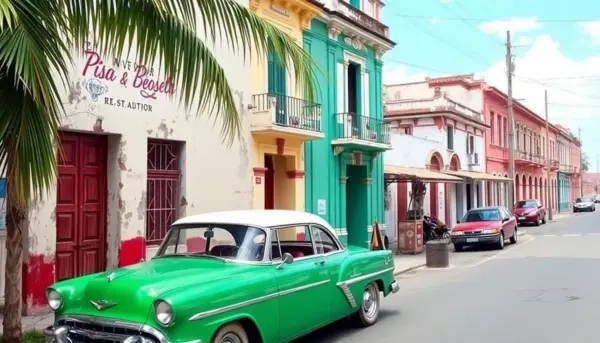Traveling to Cuba is an unforgettable experience, filled with vibrant culture, stunning landscapes, and rich history. However, it’s essential to prepare adequately to ensure your trip goes smoothly. Here are 45 comprehensive tips for traveling to Cuba that could save you from common pitfalls and enhance your journey.
Understanding Cuba's Unique Character
Cuba is a fascinating destination with a distinctive personality shaped by its complex history. To truly appreciate its culture, it’s vital to learn about its past. Understanding key historical events, such as the revolution and the subsequent embargo, can provide invaluable context for your visit. You might find it beneficial to read a brief overview of Cuban history before you go.
Planning Your Itinerary
For a well-rounded experience, plan for a minimum of two weeks. A suggested itinerary could include:
- Havana – 2 days
- Trinidad – 2 days
- Santa Clara – 1 day
- Cayo Santa María – 3 days
- Varadero – 3 days
- Viñales – 2 days
- Return to Havana – 1 day
For those with more time, venturing to the southern regions, such as Camagüey and Santiago de Cuba, is highly recommended. These areas offer a different perspective of Cuban life and culture.
Navigating Visa Requirements
Yes, you need a visa to travel to Cuba, which is known as a Tourist Card. This can be obtained in advance through the consulate or an online service that specializes in travel documents. Additionally, it’s mandatory to have travel insurance for your trip. Companies like IATI offer suitable coverage for your stay.
Note: Since 2021, the U.S. has classified Cuba as a state sponsor of terrorism, which may complicate travel if you have visited Cuba before trying to enter the U.S.
Currency and Money Matters
As of now, Cuba primarily uses the Cuban Peso (CUP). Previously, the convertible peso (CUC) was in circulation, but it has since been phased out. To avoid high fees, do not bring U.S. dollars, as they incur a 10% penalty when exchanged. Instead, bring euros for a better exchange rate.
Here are some tips regarding money in Cuba:
- Use CADECA for currency exchange; they are widely available.
- ATM availability is limited; however, some accept foreign cards.
- Consider prepaid travel cards like Revolut or N26 to minimize fees.
Connecting with Locals
The true treasure of Cuba lies within its people. Engage with locals, be friendly, and ask questions! They can offer insights and experiences that are often not available through traditional tourist paths. Conversations with taxi drivers and shop owners can reveal hidden gems and local stories.
Transportation Options in Cuba
Traveling around Cuba can be done via various means, each offering its unique experience:
- Taxis: They are convenient but can be pricey; consider sharing rides with fellow travelers.
- Viazul Buses: The only tourist bus service, which can be booked online. While not the cheapest, it’s reliable.
- Shared taxis (almendrones): These are usually affordable and provide an authentic travel experience.
Must-Try Local Delicacies
While in Cuba, don’t miss the chance to indulge in local cuisine. Try dishes like ropa vieja and congrí. Also, sample the famous mojito—although you may want to steer clear of the touristy bars to find more affordable and just as delicious versions elsewhere.
Respecting the Environment
Cuban wildlife is precious, and it’s vital to respect it during your travels. Avoid engaging in activities that exploit animals, such as horse-drawn carriage tours or dolphin shows. If you see sea stars, please do not remove them from the water for photos.
Preparing for Internet Access
Cuba has limited internet, which can be a shock for many travelers. Wi-Fi is primarily available in public areas like parks and hotels, but you will need to purchase a card from ETECSA. Embrace the opportunity to disconnect and immerse yourself in the local culture instead!
Safety Considerations
Cuba is generally safe for travelers, with a low crime rate. However, it’s wise to maintain common-sense precautions. Avoid displaying valuables and stay vigilant, especially at night. Always trust your instincts and seek help from locals if needed.
Health and Hygiene Tips
When it comes to health, avoid drinking tap water. Stick to bottled water and be cautious with ice in drinks, as it may be made from untreated water. Carry necessary medications and consider bringing a basic first-aid kit for common ailments.
What to Pack
Your packing list should include:
- Light clothing: Lightweight, breathable fabrics are ideal for the tropical climate.
- Sun protection: Sunscreen, hats, and sunglasses are essential.
- Power adapter: Bring a converter for American-style plugs.
- Repellent: Insect repellent can help avoid mosquito bites.
Accommodation Advice
Though hotels are available, consider staying in casas particulares (private homes) for a more authentic experience. These accommodations often come with the added benefit of local insights and hospitality. Booking a few nights in advance is advisable, though you can plan the rest of your stay on the go.
Activities to Explore
Engage in activities that showcase the beauty of Cuba:
- Visit the Malecón: A stroll at sunset along Havana’s seawall is a must-do.
- Explore Viñales Valley: Known for its stunning landscapes and tobacco farms.
- Cultural tours: Participate in salsa classes or music workshops to dive deeper into Cuban culture.
Emergency Contacts
In case of emergencies, familiarize yourself with local services. Keep a note of essential contact numbers, including your country's embassy, local hospitals, and emergency services. This preparedness can give you peace of mind during your travels.
For an engaging visual guide to these tips, check out this informative video:
Conclusion
Cuba is a destination that captivates the heart and soul of every traveler. With its rich history, warm people, and vibrant culture, your journey will be memorable. Follow these tips to make the most out of your experience, and you may find yourself yearning to return to this enchanting island. Safe travels!




